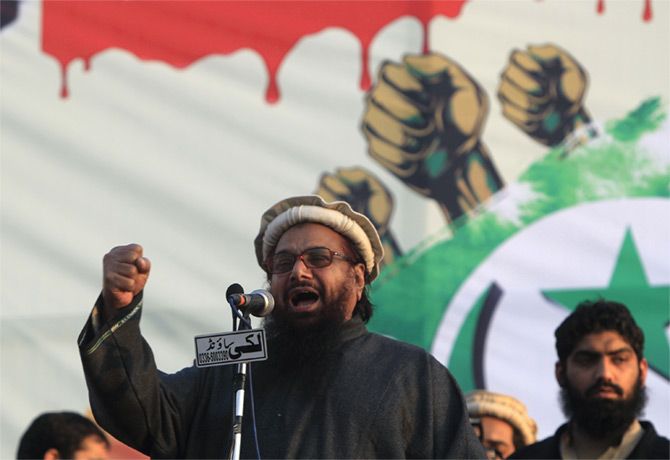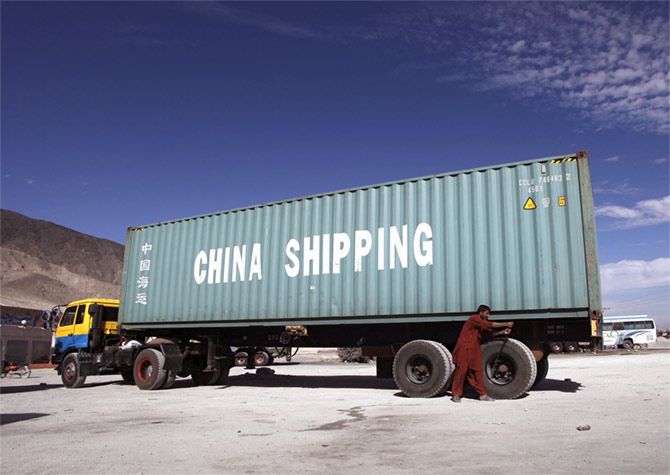'There were assurances that Jaish-e-Mohammad was being reined in as was the Lashkar-e-Tayiba, but Pakistan's security forces could not risk opening too many dangerous new fronts,' notes former foreign secretary Ambassador Shyam Saran, who has just returned from a visit to Lahore.

I was in Pakistan last week after a gap of nearly 10 long years. The country has changed in some ways -- though the attitude towards India remains a mix of warmth and friendliness at the individual level, but Solidarity Day on February 6, my last day in Pakistan, brought the latter aspect into sharp relief.
From interactions with a wide spectrum of Pakistanis, it was clear that the military is the dominant player and exercises virtual veto over policies concerning defence and security and relations with India, the US, China and Afghanistan.
Thanks to its operations against the Tehreek-e-Taliban Pakistan and its relative success in reducing violence and gangsterism in Karachi, the army and its chief Raheel Sharif enjoy renewed popularity while the attitude towards the civilian political leadership is critical and even dismissive.
The military was said to be on board in the pursuit of better relations with India, but within narrowly circumscribed limits. It was acknowledged that hostility and mistrust of India was embedded in the military's DNA and unlikely to change in the foreseeable future.
I recalled to some of my interlocutors the fruitless efforts by the Indian side to promote military-to-military confidence-building measures through regular exchanges between the National Defence Colleges and Defence Staff Colleges of the two countries, and by holding sporting events and the like.
The response was that such an initiative was unlikely to find favour since the Pakistani military, in all its training courses, starting with cadets, projects India as a mortal enemy. Exchanges of the kind I had mentioned would be seen as compromising this ideology.
This confirms my longstanding belief that the objective of our Pakistan policy should be the management of a deeply adversarial relationship which may evolve only gradually towards a more friendly future.
This also implies that any Indian initiative which appears to threaten the Pakistan military's ideology and its pre-eminence is likely to invite a strong and hostile counter-reaction, either directly or through proxy non-State actors. We have witnessed this in the past.
The better alternative is to seek modest and incremental improvements in relations which do not appear threatening and hope that cumulatively, over a period of time, these will add up to a more normal and even friendly relationship.
The terrorist attack against schoolchildren in Peshawar more than a year ago and the more recent attack on the Bacha Khan University in Charsadda do appear to have brought about a change in public mood against jihadi and militant groups. There are fewer sectarian attacks. The constant complaint was that India had failed to recognise this significant change.
There were assurances that the Jaish-e-Mohammad was being reined in as was the Lashkar-e-Tayiba, but that security forces could not risk opening too many dangerous new fronts while the TTP was being tackled.
Quite predictably there were dark suggestions that India, too, had been supporting anti-Pakistan groups, perhaps even the TTP, and most certainly the Baloch insurgency. In every case of Pakistani misdemeanour, there is an effort to establish 'immoral equivalence' by positing a corresponding Indian misdemeanour. This is unlikely to change.
If for its own reasons the Pakistani State acts against some of the jihadi groups it has nurtured all along, this is welcome and India should acknowledge and encourage this trend.
One bright spot was the general acknowledgement that the reaction of the Indian and Pakistani governments to the Pathankot terrorist attack had been mature and restrained. This was, in part, attributed to the regular engagement between the national security advisors of the two countries. The hope was expressed that this new channel would endure and the foreign secretar y-level talks would take place sooner than later.
y-level talks would take place sooner than later.
The China-Pakistan Economic Corridor -- CPEC -- figured prominently in conversations being described as a game changer. The not-so-subtle message was that this had given Pakistan options beyond seeking cooperation with India.
This major development, it was argued, was being reinforced by the prospects for much closer and improved relations with Iran after the lifting of sanctions. Iran was also thankful to Pakistan for not having joined Saudi Arabia in its sectarian war against the Houthis in Yemen.
The revival of the Iran-Pakistan gas pipeline together with the recently concluded agreement on the Turkmenistan-Afghanistan-Pakistan-India -- TAPI -- gas pipeline further reinforces Pakistan's role as a regional node.
Reference was also made to the country's indispensable role in any Afghan peace settlement and that this was recognised by President Ashraf Ghani's Afghanistan, the US, and China.
For these reasons, it was held, India risks being bypassed in the region. Some suggested that Prime Minister Narendra Modi's recent visit to Lahore was out of a sense of weakness, not a sign of confidence.
There seemed to be no hurry to follow through on the grant of Non Discriminatory Trade Access (Most Favoured Nation status by another name) to India. This was linked to the resumption of comprehensive dialogue.
Clearly, Pakistan has a lot riding on the CPEC, though some Pakistanis were critical of the exaggerated expectations it has spawned.
Though I have visited Lahore earlier, this was the first time I was able to experience the vibrant life in the city away from officialdom. It remains a city of people who celebrate its rich and varied cultural heritage and embrace its tradition of intellectual discourse, poetry, music and sophisticated cuisine. Its Sufi shrines are overflowing with throngs of gentle worshippers defying the monochromatic urgings of the Wahhabi-inspired jihadi groups.
It is only the pervasive presence of security all around the city which reflects the unseen threat that strikes and kills without warning. Pakistan's diversity is real and should be factored into our policies.
There is universal resentment over the highly restrictive visa regime, the little humiliations heaped on those brave enough to cross national boundaries, and the constant discouragement to the coming together of scholars, artists and writers -- all in the name of reciprocity and exaggerated security concerns.
And yet, these are the constituencies that may be able to craft a different and more benign narrative of India-Pakistan relations over time.
A self-confident India should be able to create opportunities for expanded engagement with these constituencies even as it confronts the hostility of the Pakistani State. The affinities across the border are real and need to be nurtured for their own intrinsic value.











